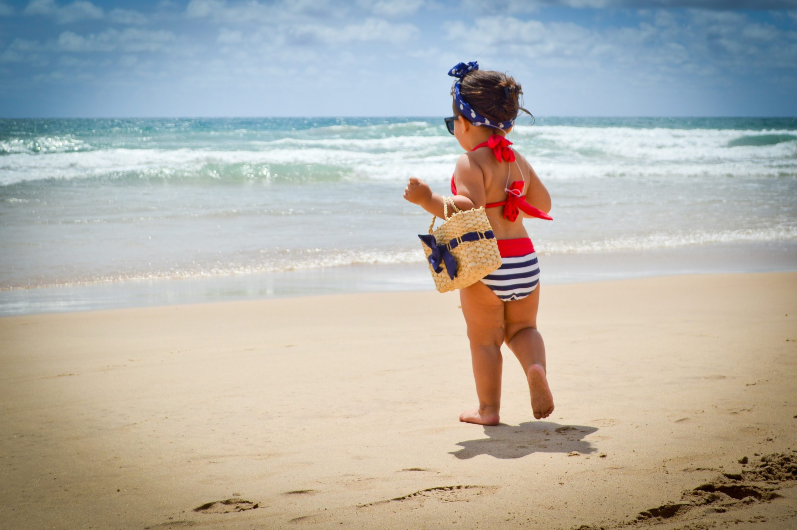
Summer is here in Southwest Florida! With that being said, we all know exactly how hot it can be, and we want to do our best to keep our families safe and healthy with all of this new time we have for exploring outdoors. Although we go through it every year, a lot of these reminders can seem pretty obvious, but we keep repeating them so we don’t forget. Sometimes we forget how harsh heat waves, the sun, and vacation preparations can be. Even with these 4 items being pretty obvious, they should always be readily available.: sunscreen, insect repellent, antibiotic ointment, and bandages.
A quick thing to remember are the different types of rays that come from the sun. There are UVA rays that cause the skin to are and UVB rays that cause the skin to burn. Both of these rays are bad, especially when it comes to children. When looking for a sunscreen, grab one that is broad spectrum sunscreen that will cover bother UVA and UVB rays with an SPF over 30.
Kids have so much free time during summer vacation, and a lot of it will be spent outside. When our kids play outside we are quick to grab the sunscreen, though sunscreen is not the best protector for skin — shade is. If it is possible, it is always better to use things that cannot be absorbed into the skin. With that being said, wearing protective clothing like rash guards, hats, and sunglasses are always an added option. Another thing to take into consideration is making plans at certain times of the day. The sun is most intense between the hours of 10am and 4pm.
Remember that anything over an SPF of 30 doesn’t really make too much of difference. What is important is how you use it. Always apply 20 minutes before planning on being out in the sun, and continue to apply every 1 to 2 hours when there is water involved or a lot of activity.
Look for sunscreens that include zinc or titanium and avobenzone — these are physical barriers rather than chemical ones — that are less likely to be absorbed in the skin.
When you are looking for the right sunscreen try to look from brand’s that have the ingredients zinc or titanium and avobenzone. These are less likely to be absorbed into the skin since they are physical barriers, rather than chemical barriers.
Mosquitoes, wasps, flies and other insects are especially active in the Summer time. Given all of the talk about Zika, many of us have especially been paying attention to mosquitoes. Below you will find a few easy tips to follow on what repellents to use in an area that may be experiencing Zika cases.
If you live in an area where there are a lot of insects — such as near standing where where mosquitoes breed — children should always be covered with long sleeve shirts and long pants. This will help protect skin and prevents bites more than anything else. If there are any areas of skin that are exposed, use repellent.
Use EPA-registered(Environmental Protection Agency) insect repellents. These repellents are evaluated for safety and how effective they are. Be sure to read the canister directions, and reapply as directed.
Avoid spraying repellent onto skin that is under clothing, and do not use sunscreen products that are a mixture of sunscreen and insect repellent. Always follow the directions on the label, and reapply as directed. If you do need both of these products, it is best to apply sunscreen followed by the insect repellent over it.
Do not use insect repellent on babies under 2 months of age. it is best to protect them with clothing, or avoid going out in areas where insects are known to be active.
Be sure children are in clothing that cover their arms and legs.
Keep in mind these insects are more active during evening hours.
Using netting for strollers, or if you are sleeping outdoors.
Do not apply insect repellent to a child’s hands, eyes, mouth, open wounds, lacerations, or irritated skin.
Never spray insect repellent directly on a child’s face. Always spray repellent onto your hands, and gently apply to child’s face.
Clean scrapes and cuts immediately with clean water. Try to keep your child still as you run the water over the wound, rather than soaking it. Using tap water is safe, and the faucet pressure can sometimes help irrigate the wound. Consider running these injuries under water for a few minutes, if the child is willing to cooperate.
For minor cuts and scrapes, there is no need in using iodine, iodine-containing cleanser, or hydrogen peroxide. There is a chance that you can cause more irritation to the already damaged tissue.
After the wound is clean, a topical antibiotic ointment should be applied, and then loosely bandaged. The ointment and a fresh bandage should be applied 2 or 3 times daily.
Take note that the sun can cause scarring to darken. Try to keep your wound from being exposed to the sun by keeping them covered. If a scar does appear, continue to try to keep it out of the sun for at least a year to prevent long-lasting scar formation.
For any questions or concerns regarding summertime care for your child, feel free to contact your SWFL pediatrician at MacKoul Pediatrics. You can reach us at (239) 573-2001.
MacKoul Pediatrics is an amazing local pediatrics office in Cape Coral, FL where caring, compassionate doctors and nurses work with you to keep your children as healthy as possible. MacKoul cares for children from birth to college age, from Cape Coral, Fort Myers, Naples, and beyond.
June 12, 2017
![[IMAGE]](images/858_ncqa_logo_centered.png)
